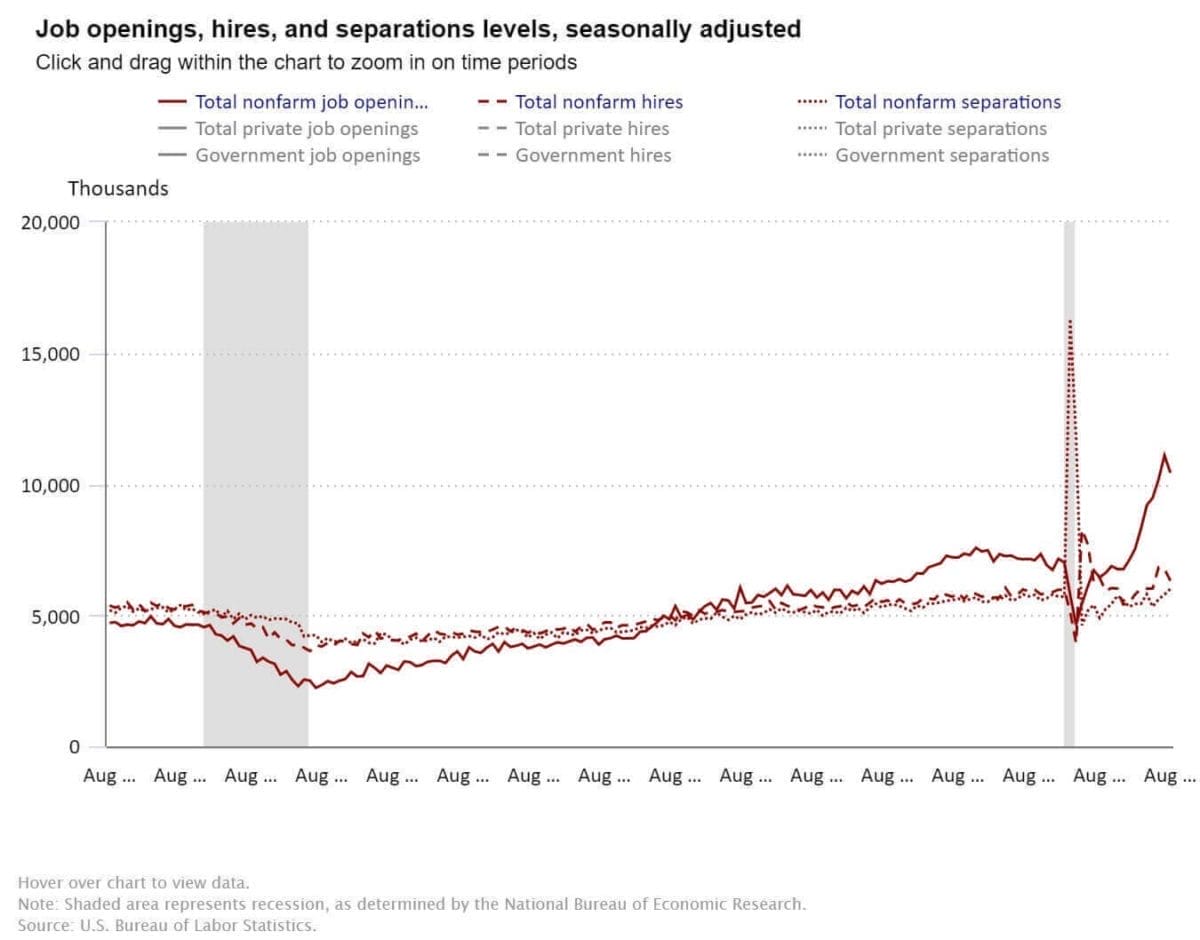Are you worried about getting fired, and you are thinking about quitting voluntarily to avoid a difficult situation?
According to data from the U.S. Bureau of Labor Statistics
- 4.3 Million employees quit their job within a month, with a resignation rate of approx. 2.9% in 2021.
- 1.3 Million employees get fired from their job within a month, with a layoff rate of approx. 0.9% in 2021.
Employees are 3.3 times more likely to quit than to get fired or lay off.
In some cases, resigning before you are being laid off makes sense, while in other instances, it doesn’t.
Is It Better to Quit or Wait to Be Fired?
Generally, it is better to quit and resign voluntarily than be fired. When you quit, you choose to leave the job on your own in your own accord. Getting fired is when you are forced to leave a position by the company.
There are both pros and cons of quitting a job voluntarily over getting fired by the company.
We shall look at some of them and understand why.

Pros of Quitting Your Job Over Being Fired
Quitting your job can avoid the unpleasant feeling of losing your job suddenly. And sometimes quitting your job without another make sense.
Getting fired can be emotionally traumatizing for most people, and people who get fired often develop negative emotions.
Employees will go through the 5 phases of job recovery from getting fired, but the recovery will often take time.
The emotional impact of getting fired
Getting fired and losing your job suddenly can cause you to feel like a failure. The experience of being forced to leave your job position can cause you to have a range of negative emotions; shamefulness, worthlessness, embarrassment, self-pity, and eventually depression.
Quitting might be better for mental health
When you quit, you are mentally prepared to move on. Instead of feeling forced to leave a job, you are the one in control, and you are the one who chooses to leave the company.
Quitting a job voluntarily reduces the stress and emotional roller coaster you may face when getting fired from your position
When you quit your job, you are ready to move on to another job or prepared to be unemployed for a short time.
Quitting or resigning voluntarily protects your reputational and makes it easier for you to find a job while getting fired doesn’t.
Quitting a job is quite common and generally, employees change their job every 1 to 3 years. Seldom do we see an employee work in a company for more than 10 years.
Having said that, getting fired from a job can be bad for your reputation. It might be ok if you are being layoff due to the pandemic or the company’s closure. But if you are being fired for poor performance, you may need to explain to your interviewer why you are being fired.
There is an inherent bias for most hiring managers,
“Employees who are fired from a job are usually bad.”
How to answer being fired interview questions?
Be honest to your hiring manager that you are being fired, do not try to hide from them or tell lies.
Often your potential employer will do a cross-reference with your previous employer about your performance.
- Be honest. Always be honest about why you are being terminated
- Keep it simple. Don’t go into details or badmouthing your previous employer.
- Remain positive. Be positive in both your tone and posture.
- Demonstrate personal growth. Demonstrate that the previous negative experience doesn’t define you.
- Promote your skills and experience. Promote your capabilities and your suitability for the job role.
- Negotiate for a neutral reference. If your hiring manager wants a reference, ask if you can recommend them a neutral reference that can represent you without biasness.
Cons of Quitting compared to getting fired from your job.
Quitting voluntarily makes it hard to get unemployment benefits
Employees who quit voluntarily find it hard to be eligible to collect unemployment benefits. Employees may only get unemployment benefits if they left for a ” good cause”. Good cause means that you must have specific reasons why you quit.
“Good cause” for quitting a job or decreasing your work hours includes:
- Have a family crisis or emergency that you have to deal with during working hours.
- The employer makes unreasonable demands; not paying on schedule.
- Employment becomes unsuitable to work; salary below minimum wage, work activities discriminate you, workplace subject you to unreasonable health and safety risk, etc.
- Temporary unemployment due to acceptance of another job or enrollment in a school or training program.
Your eligibility may vary depending on where you live as unemployment programs are often determined by states.
Quitting voluntarily makes it hard to get severance pay
Employees who quit voluntarily will not be able to get severance pay. As it is a situation that is out of your employer’s control, your employer will not owe you any severance when you leave the company.
Even if you are being fired, unless your company’s contract has this, severance is not always guaranteed.
- According to a survey of more than 1,500 HR professionals, 44% of employees received severance pay after an involuntary separation
But there is still a gray area on the topic of a severance package.
Voluntary separation packages are sometimes offered by the company to cut back on the workforce.
The company offered voluntary separation packages to cut costs on the salary and work benefits.
If you accept voluntary separation packages or early retirement packages, the company will have to pay what is stated in the package.
Quitting or resigning voluntarily makes it harder to pursue any legal actions against your company if required.
Quitting makes it hard to pursue any wrongful termination or retaliation claims against your employer. When you resign voluntarily, you forfeit these claims even if these claims might be valid if you are being fired instead.
Often, employees are forced to resign due to a toxic work environment, harassment, and all forms of discrimination (Pregnancy discrimination, gender discrimination, religious discrimination, etc.)
Unless you can prove that you are being forced to resign, or legally known as constructive discharge. It may allow you to potentially file a wrongful termination, discrimination, or harassment suit.
Nonetheless, constructive discharge is often hard to prove.
Pursuing any legal action such as, wrongful termination claim is going to be much easier if you tough it out and get fired.
What is “Constructive discharge”?
“Constructive discharge” is a legal term where an employee resigns or retires involuntarily because the employer created a hostile work environment, applied pressure, or coercion that forced the employee to quit or resign.
In a nutshell, “constructive discharge” means “forced to resign”.
The definition of constructive discharge may vary from state to state.
Would you rather quit or get fired?
Quitting voluntarily (resigning) and getting fired have their pros and cons. How you leave your job is a personal decision. Even if you hate your job and want to quit, you’ll need to weigh both the pros and cons.
There is no right and wrong answer, the choice is totally up to you to decide.
According to the statistics, workers are 3.3 times more likely to choose formally resigning in compared to getting fired.
However, if you choose to leave your job it should be a decision that you should think about thoroughly.
“If given a choice between resigning and getting fired, workers should consider the benefits of termination that don’t comes with resignation.”
– Stygar, employment attorney.
However, HR professionals and career advisors have different perspectives.
“No matter what the scenario is, be proactive, not reactive.
Being forced to leave, and volunteer to leave can be the difference between getting the next job, or not.”
– A.C., Editor of hqhire.com.
Like this advice?
Let us know in the comments below!
Up Next… Is it OK to take a job with less pay and be happy?
Join over 11,000+ achievers who are committed to achieving their career goals!






